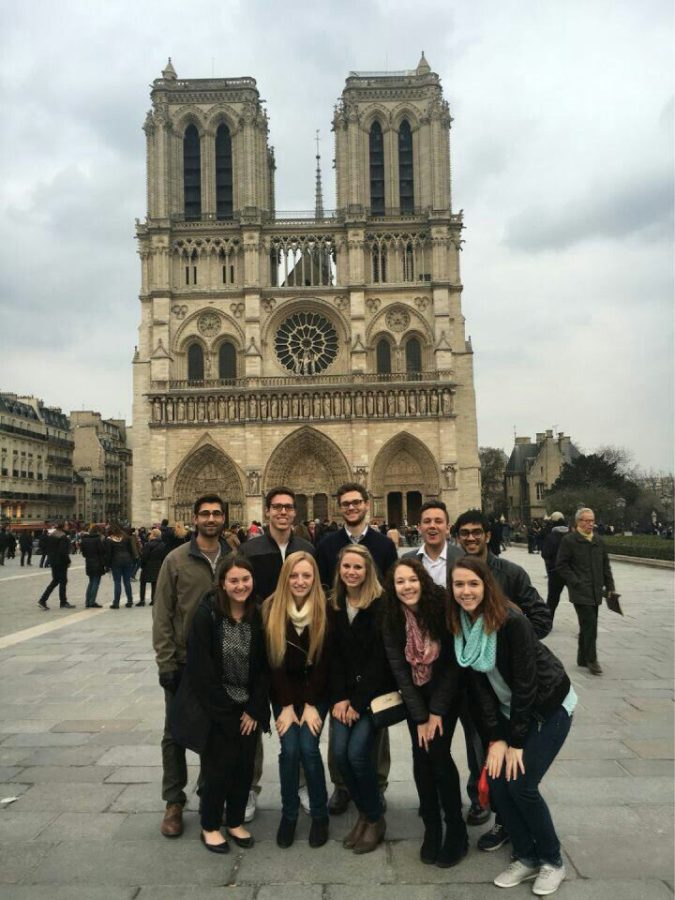Kent State students recall terrorist attacks in Brussels
March 30, 2016
When Alana Biles, a 19-year-old junior economics major, was attending an economic lecture at the National Bank of Belgium in the city of Brussels on March 22, she had no idea that the morning would take a turn for the worse.
“You heard a knock on the door, and a security guard walked in to pull out the speaker to speak to him in a different language,” Biles said. “The speaker then came back to the room and nonchalantly says that there’s been an attack.”
On the Tuesday morning of March 22, the Islamic State carried its deadliest attacks since the November 2015 Paris attacks, setting off three coordinated bombings that resulted in 32 dead and over 300 injured.
The first two bombs were set off at the Brussels airport near the check-in desks, with the third bomb detonating hours later at the Maalbeek metro station in the middle carriage of a traveling train heading toward the center of the city.
Biles, along with 18 Kent State students and two faculty members, were in the center of Brussels when the attacks occurred, approximately two miles away from the Maalbeek train station. No students heard or saw any of the bombings but did see the aftermath in the form of helicopters, door-to-door searches and police sirens.
Professor Donald R. Williams, who teaches economics at Kent State College of Business Administration, was leading his student group through a spring break abroad program called European Economic Issues, when the attacks were unfolding that morning.
“We had an appointment with the National Bank of Belgium and we were learning about economic issues when we learned of the bombings that occurred that morning at the airport and the metro,” Williams said. “So that afternoon we canceled our visit to the European Economic and Social Committee, which was scheduled for 2 p.m. and went back to the hotel instead.”
Professor Williams and his student group then stayed at the hotel until the lockdown was lifted at around 4 p.m. but decided to remain at the hotel since fears were still high of another possible bombing.
“I stayed at the lobby for most of the lockdown, where I told the students to call their parents and to let them know they’re okay,” Williams said.
Professor Williams then made a call to Kent State Office of Global Education where Ediz Kaykayoglu, the Kent State Director of Education Abroad, answered at approximately 5 a.m. in U.S. eastern time.
“I got a phone call early morning on Tuesday from the faculty telling me that a terrorist attack had happened and that all the students were okay,” Kaykayoglu said.
“We then looked at the itinerary and assessed the situation from any avenue available so that we could have a better grasp of the situation and make sure that our students remained safe.
Kaykayoglu said that other groups of Kent State students who were studying abroad in Europe were planning on heading to Brussels and had to halt their trip in order to maintain their safety.
When asked about if Kent State had an emergency safety plan they provide for students who are studying abroad in case of a disaster or a terrorist attack, Kaykayoglu listed a variety of methods the university prepares the students and keeps in constant contact with them.
“We send out a weekly Google document that we have students studying abroad fill out which asks for their whereabouts, future traveling plans and contact information,” Kaykayoglu said. “This way we always know what our student are located at and what their future plans hold.”
Eric Mansfield, the Kent State Executive Director of Media Relations, added that every studying abroad program has an emergency plan that makes sure that Kent State students and faculty have a way of remaining safe during a crisis.
When Biles was asked about whether she has become more fearful of the world amid the terrorist attacks, she responded that to a degree she has become worried, mostly because her parents are—but she doesn’t view the whole world as being dangerous. Although Kent State students chose to stay in their hotel after lockdown was lifted, Biles said people were still in the streets and Brussels life resumed later in the evening.
“It could happen anytime, anywhere, but it’s not going to deter me from traveling the world,” Biles said.
Angelo Angel is an entertainment reporter for The Kent Stater. Contact him at [email protected].

























